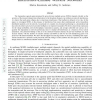Free Online Productivity Tools
i2Speak
i2Symbol
i2OCR
iTex2Img
iWeb2Print
iWeb2Shot
i2Type
iPdf2Split
iPdf2Merge
i2Bopomofo
i2Arabic
i2Style
i2Image
i2PDF
iLatex2Rtf
Sci2ools
139
Voted
CORR
2011
Springer
2011
Springer
Downlink SDMA with Limited Feedback in Interference-Limited Wireless Networks
The tremendous capacity gains promised by space division multiple access (SDMA) depend critically on the accuracy of the transmit channel state information. In the broadcast channel, even without any network interference, it is known that such gains collapse due to interstream interference if the feedback is delayed or low rate. In this paper, we investigate SDMA in the presence of interference from many other simultaneously active transmitters distributed randomly over the network. In particular we consider zero-forcing beamforming in a decentralized (ad hoc) network where each receiver provides feedback to its respective transmitter. We derive closed-form expressions for the outage probability, network throughput, transmission capacity, and average achievable rate and go on to quantify the degradation in network performance due to residual self-interference as a function of key system parameters. One particular finding is that as in the classical broadcast channel, the per-user fee...
| Added | 19 Aug 2011 |
| Updated | 19 Aug 2011 |
| Type | Journal |
| Year | 2011 |
| Where | CORR |
| Authors | Marios Kountouris, Jeffrey G. Andrews |
Comments (0)

